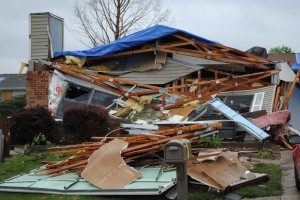
In the aftermath of a catastrophic event—whether it's a tornado, hurricane or other natural disaster—survivors face a long, challenging recovery. While they are rebuilding their lives, they also must take to care to guard against additional, man-made threats: identity thieves and scammers.
For example, after Hurricane Katrina, the FBI reported a marked increase in insurance fraud in the area. Of the more than 80 billion government dollars appropriated for reconstruction efforts in the region, it is estimated that insurance fraud accounted for between $4 and $6 billion.
Survivors can guard against identity thieves and scams with these tips:
-
 Call your bank, credit union, insurer or financial planner to see if they offer identity theft management services. Some financial institutions offer this service for free, as a perk for being a member or account holder.
Call your bank, credit union, insurer or financial planner to see if they offer identity theft management services. Some financial institutions offer this service for free, as a perk for being a member or account holder. - Protect important information and documents. Whether you’re in a shelter, staying with friends or crashing on your family’s couch, never let these items leave your sight. They are the key to your identity—and you will need this information to prove who you are.
- Be proactive and check your credit report. Call 1-877-322-8228 or visit www.annualcreditreport.com. Consider adding an initial security alert to your credit report by visiting www.experian.com/fraud/center.html or by calling 1-888-EXPERIAN (397-3742).
- Ask the post office to hold your mail until you return home. This will keep thieves from finding sensitive materials that are left in your mailbox.
- Watch out for scams. Disasters attract good Samaritans, but they also attract criminals looking to take advantage of people in a time of distress. Here are just a few scams to watch out for:
- Photos with malware. Thieves count on people to be hungry for news, so they infect images and video with malware. Stick with legitimate sites, such as your local news station or newspaper for the latest information. Be wary of links on Twitter, Facebook and other social networking sites.
- Fake charitable organizations. Watch out for fake charitable organizations that have names similar to reputable institutions. These sites often end in .com (instead of the typical .org for nonprofits). They’re designed to fool you into thinking you’re donating to a good cause when, in reality, you’re donating your money and personal and financial information to thieves.
- Illegitimate websites. Double check the legitimacy of the site you’re clicking to from your email, Facebook or elsewhere. When in doubt, check your local American Red Cross or the National FEMA site to find local help.
- Insurance scams. If you’ve experienced damage to any of your personal property, call your insurance company first. Don’t fall for fly-by-night “professionals” who make false guarantees about a claims check, damage appraisal, inspection or water quality testing.
Take immediate action. If you discover that you are missing any identification, financial instruments, or any item that can be used to commit fraud or harm your identity do not hesitate to report it. The longer you wait, the more damage that can be done by criminals and identity thieves.
Matt Cullina is chief executive officer at CyberScout.